
Category: Data centers
Data Centers Are an Easy Scapegoat for Failing Electrical Grids
Data centers are easy targets. They require large amounts of water, electricity, and land. They’re an eyesore. Of the 3,907…
On Venezuelan Oil Tankers, Chinese AI, and American Energy Traitors
As the U.S. Navy leads the largest fleet ever assembled in the Caribbean Sea to pressure the illegitimate Maduro regime…
Liz Warren hustles Trump with a housing bill from hell

What is it about the National Defense Authorization Act that makes it a dumping ground for every dumb liberal pet project?
First the Trump administration pushed an AI data-center amnesty that would have stripped states of authority over massive, power-hungry facilities. Then lawmakers tried to slip in Sen. Elizabeth Warren’s housing bill, a package built to subsidize Section 8 tenants and builders and to fuel the very forces driving the current housing bubble. After a backlash, both provisions came out of the NDAA. Now congressional leaders plan to pass the Massachusetts Democrat’s housing bill on its own.
The real crisis comes from government debt and the inflation it fuels. This is not a shortage of lumber or land. It is a monetary chokehold created by government policy.
Earlier this year, Senate Banking Committee Chairman Tim Scott (R-S.C.) worked with Warren to move S. 2651, an omnibus housing package that expands every federal program Trump previously vowed to cut. They attached the legislation to the Senate’s NDAA, then lobbied House conservatives to adopt it in their version of the defense bill. At the last minute, House leaders stripped the language. The House Financial Services Committee now plans to mark up the bill next week.
Here’s the trouble: The bill misdiagnoses the housing crisis. It treats high prices as a supply shortage instead of a government-fueled asset bubble and inflationary pricing distortion.
The result is predictable. Its 40 provisions would expand Section 8, loan subsidies, “affordable housing” grants, and even looser mortgage programs for people priced out of the market. Every one of these items pours accelerant on the factors that drove the 2008 bubble and the post-COVID spike.
Government subsidies for overbuilding and for buyers who cannot afford homes created the crisis. Yet like a dog returning to its vomit, Scott, the president, and Senate Democrats are endorsing Warren’s 2020 campaign platform to revive the same model. The bill promises builders and activist groups federal cash in exchange for regulatory concessions. The trade-off is disastrous.
Section 202 creates a new federal grant program to fund local housing projects in designated zones — a warmed-over version of the community-engineering schemes Obama’s Department of Housing and Urban Development pushed a decade ago.
Meantime, Section 209 establishes a $200 million yearly fund at HUD to award “innovative housing reforms” to localities that reshape zoning to favor dense, subsidized units.
Conservatives would call these incentives an invitation to replicate failed urban policies in red suburbs. The bill rewards grifting nonprofits and community organizers who treat federal housing programs as political infrastructure.
At the same time, the administration is pushing rules that limit red-state zoning authority to clear the way for data-center construction while promoting Section 8 expansion with new incentives and zoning guidance. It revives, in effect, Obama’s Affirmatively Furthering Fair Housing regime — the same racial-gerrymandering tool Trump killed in his first term. Supporting the Scott-Warren bill would revive it in practice.
Worse, the bill rests on a false premise. America doesn’t have a housing shortage. According to Redfin, as of October sellers outnumbered buyers by 36.8% — about 529,000 more sellers — the largest gap since 2013. Census data shows about 148 million housing units for roughly 134 million households, a surplus of around 14 million units. When Trump took office, the vacancy count stood near 11 million, yet prices were far more affordable.
The real crisis comes from government debt and the inflation it fuels. Construction costs surged with inflation. Interest rates spiked to service that debt, creating an interest-rate cliff that locked millions of homeowners into sub-3% mortgages. They cannot sell without doubling their monthly costs. High rates froze the existing inventory in place. This is not a shortage of lumber or land. It is a monetary chokehold created by government policy.
RELATED: Why the kids are not all right — and Boomers still pretend nothing’s wrong
 Photo by Andrew Lichtenstein/Corbis via Getty Images
Photo by Andrew Lichtenstein/Corbis via Getty Images
Federal housing policy adds another layer. Fannie Mae and Freddie Mac long prioritized “access to credit” over price stability. By guaranteeing high-risk loans and encouraging low down payments, they allow buyers to bid more than their incomes justify. Subsidized credit lifts prices for sellers, not buyers.
S. 2651 makes the problem worse by expanding the Community Development Block Grant and similar programs, encouraging activist groups and corporate developers to overbuild units no one can afford without subsidies. That process pushes prices upward and strengthens corporate buy-ups of suburban neighborhoods.
The administration previously acknowledged these distortions. In Trump’s FY 2021 budget, the Office of Management and Budget proposed eliminating CDBG and the HOME Investment Partnerships Program, arguing that states and localities were better positioned to address affordability challenges. This new bill reverses that logic entirely.
The Federal Reserve’s rate whiplash — a decade of near-zero borrowing costs followed by sudden hikes — froze supply by trapping owners inside artificially cheap mortgages. Washington’s policies created the gridlock. The inventory exists. Monetary policy quarantined it.
What the administration needs to do is allow prices to fall back toward alignment with median incomes. That adjustment would restore affordability without new federal intervention. Instead, the FHFA is pushing lower credit-score requirements for subsidized mortgages. That mistake will repeat the pattern of enticing families into overpriced homes they cannot sustain.
Housing policy should stop trying to prop up inflated prices. The market must correct. A federal “solution” built around 40 expansionary programs will intensify the crisis, not solve it. Doing nothing would spur more affordability than this bipartisan blunder.
Ai center • Amazon • Blaze Media • Data centers • Oregon • Return
Cattle rancher battles Amazon data center accused of poisoning water supply, causing miscarriages
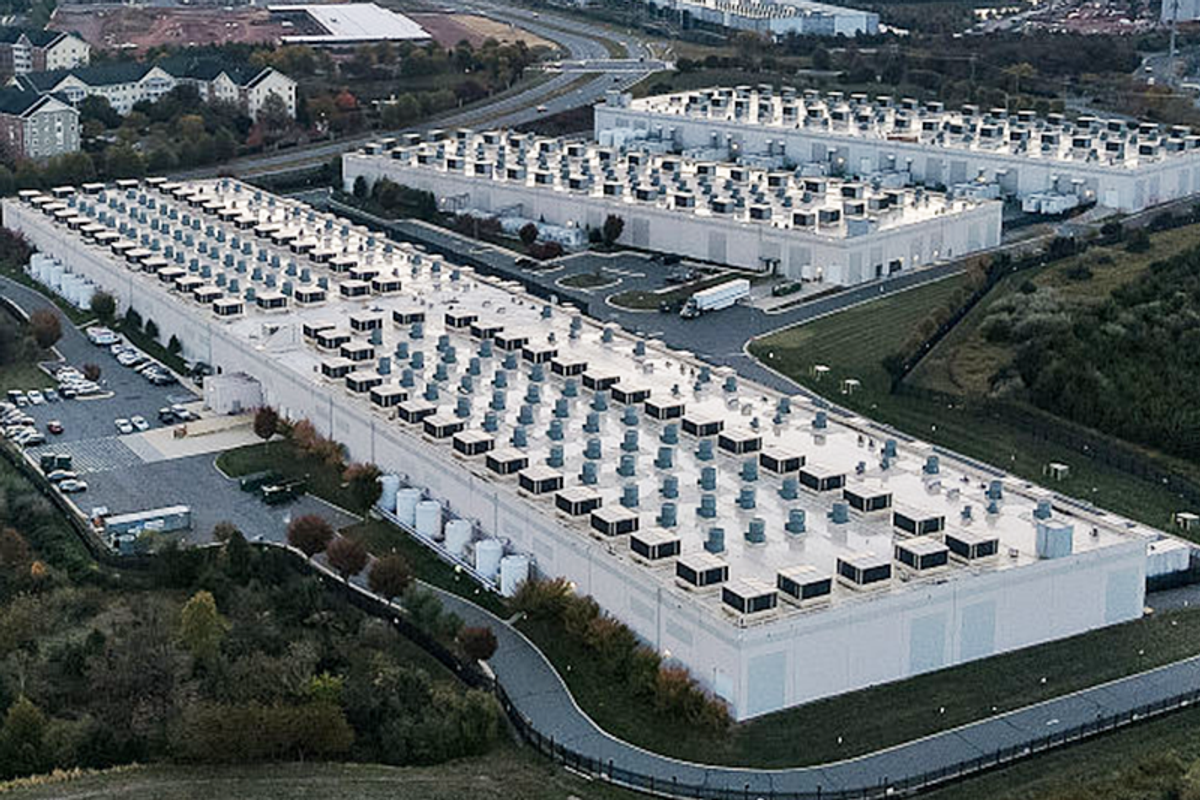
An Oregon cattle rancher did his own research into an apparent rise in obscure medical conditions after the opening of an Amazon data center.
The facility, which requires enormous amounts of water to cool its infrastructure, stands accused of adding wastewater — laden with nitrates — to an already struggling filtration system.
‘Our data centers draw water from the same supply as other community members.’
Jim Doherty from Morrow, Oregon, sought out to investigate the alleged increase in health problems stemming from toxins in the local water supply. Doherty has since performed tests, worked alongside his county, and knocked on doors to try to solve the equation. He spoke with Rolling Stone about his findings.
The rancher said he surveyed 70 local wells and shockingly found that 68 of them violated federal limits for the allowable levels of nitrates in drinking water. In the same report, Doherty detailed that of the first 30 homes he visited in his area, 25 residents had recently suffered miscarriages.
The report alleged a number of illnesses related to the water supply — which included different forms of cancer — and pointed the finger at pollution exacerbated by an Amazon data center that popped up in 2011. The square-footage of the data center ranges in estimates from 120,000 to 200,000 but comes with a 15-year tax abatement worth nearly $200 million.
The cost of this, allegedly, is a slew of health problems.
RELATED: Apple to invest $500 billion in US including new AI server factory in Texas
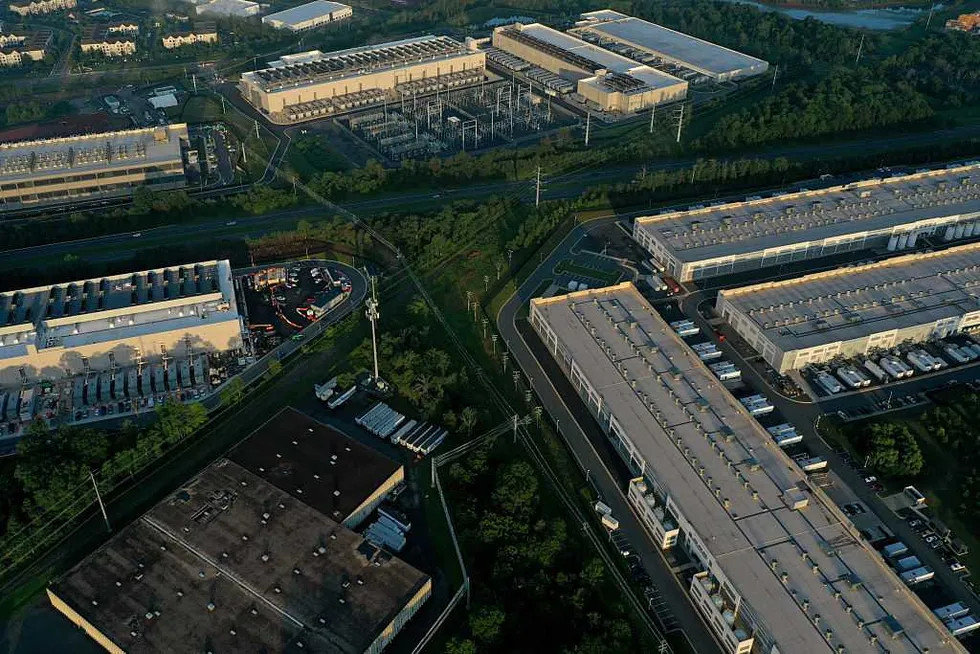 Amazon Web Services and Iron Mountain data centers in Manassas, Virginia, on July 9, 2025. Total power usage in the US is expected to climb 2.15% in 2026, spurred largely by a 5% spike from commercial users because of the expansion of data centers, according to a US Energy Department report released in June. Photographer: Nathan Howard/Bloomberg via Getty Images
Amazon Web Services and Iron Mountain data centers in Manassas, Virginia, on July 9, 2025. Total power usage in the US is expected to climb 2.15% in 2026, spurred largely by a 5% spike from commercial users because of the expansion of data centers, according to a US Energy Department report released in June. Photographer: Nathan Howard/Bloomberg via Getty Images
“One man about 60 years old had his voice box taken out because of a cancer that only smokers get, but that guy hadn’t smoked a day of his life,” Doherty told Rolling Stone.
Another woman reportedly wrote Doherty to tell him her husband got “kidney cancer in his early 40s. His doctor thought it was due to exposure to herbicides and pesticides. He lost a kidney, but he lived.”
“We had acceptable levels of [toxins in our] drinking water when we first moved there,” the woman claimed. “After my husband’s cancer, we realized they went up and up through the years. It’s very sad.”
Doherty’s wife, Kelly, also claimed that out of the 14 people that live on their road, “I think nine of them have cancer right now.”
On the contrary, Amazon spokesman Lisa Levandowski told Rolling Stone that “the apparent narrative” about the 45,000-person county is “misleading and inaccurate.”
“The truth is that this region has long-documented groundwater quality challenges that significantly predate AWS’ presence, and federal, state, and local agencies have spent years working to address nitrates from agricultural fertilizer, manure, septic systems, and wastewater from food processing plants,” Levandowski explained.
She went on, “Our data centers draw water from the same supply as other community members; nitrates are not an additive we use in any of our processes, and the volume of water our facilities use and return represents only a very small fraction of the overall water system — not enough to have any meaningful impact on water quality.”
RELATED: Zuckerberg to dump hundreds of billions into new Manhattan-size projects
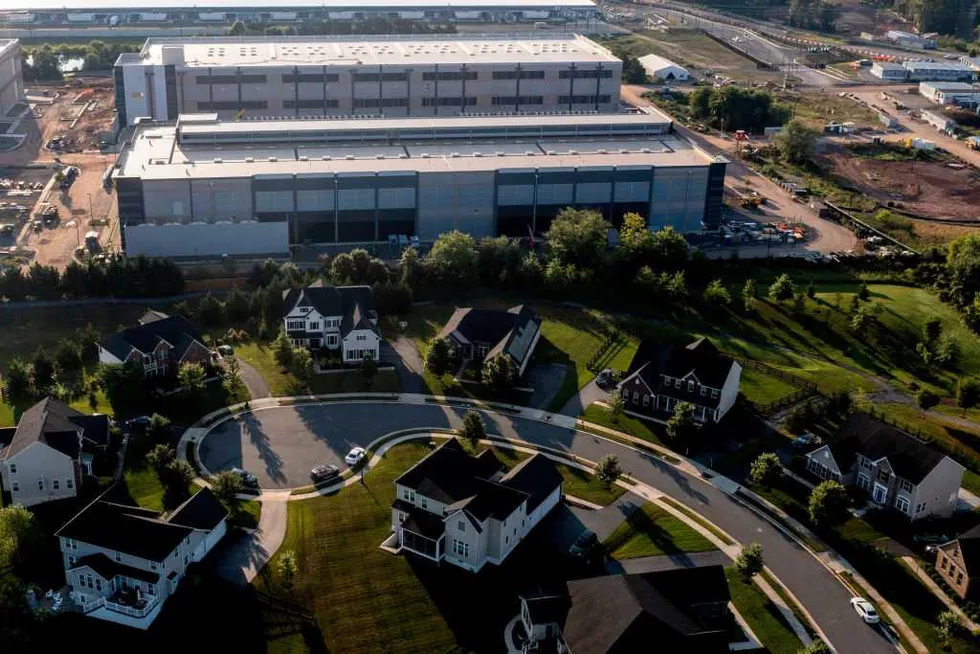 An Amazon Web Services data center in Stone Ridge, Virginia, US, on Sunday, July 28, 2024. Data center developers in Northern Virginia are asking utility Dominion Energy Inc. for as much power as several nuclear reactors can generate, in the latest sign of how artificial intelligence is helping drive up electricity demand. Photographer: Nathan Howard/Bloomberg via Getty Images
An Amazon Web Services data center in Stone Ridge, Virginia, US, on Sunday, July 28, 2024. Data center developers in Northern Virginia are asking utility Dominion Energy Inc. for as much power as several nuclear reactors can generate, in the latest sign of how artificial intelligence is helping drive up electricity demand. Photographer: Nathan Howard/Bloomberg via Getty Images
Oregon Rural Action, an activist group focused on preserving water, compared the situation to the “historical precedent” of Flint, Michigan.
“In part because of how slow the response to the crisis has been, and in part because of who’s affected. These are people who have no political or economic power and very little knowledge of the risk,” executive director Kristin Ostrom told Rolling Stone.
The argument that Amazon has increased the amount of toxins in the water is indeed a complex one as there exist arguments on both sides that require investigation to prove.
As the Department of Energy explains, the process of cooling with water typically includes water softening to remove harmful toxins, but that does not mean there aren’t additives involved in the process.
Possible additives include phosphates to prevent corrosion, acids to adjust pH levels, and anti-foaming agents, to name a few. Nitrates can also be used to prevent corrosion in cooling systems.
The DOE also notes that when water evaporates from cooling towers, dissolved solids or toxins become more highly concentrated. This is typically solved by removing a portion of the highly concentrated water and replacing it with “fresh make-up water.”
Like Blaze News? Bypass the censors, sign up for our newsletters, and get stories like this direct to your inbox. Sign up here!
2026 • Blaze Media • Data centers • democrats • GOP • Midterms
Big Tech’s AI boom hits voters hard — and Democrats pounce

Wouldn’t it be a bitter irony if Republicans lost the midterms — maybe even in conservative red states — because Democrats outmaneuvered them on the dangers of the AI data-center boom? The left now warns voters about land seizures, rising electric bills, water shortages, and Big Tech’s unchecked power. Meanwhile, Republicans stay quiet as Trump himself champions the very agenda voters increasingly fear.
During the Biden years, Republicans attacked Big Tech censorship, digital surveillance, Agenda 2030 land-grabs, and the artificial online culture reshaping young Americans. Every one of those concerns now intersects with the data-center explosion — energy demands, land use, power monopolies, and the rise of generative AI — but the political right barely whispers about it.
Republicans can channel AI toward focused, beneficial uses and away from a dystopian model that erodes civic life. Voters already want that shift.
Democrats don’t make that mistake. They see a potent electoral weapon.
Georgia hadn’t elected a Democrat statewide since 2006. Yet Democrat Peter Hubbard defeated a Republican incumbent on the Public Service Commission by 26 points by hammering “sweetheart deals” GOP officials granted hyperscale data centers. Voters in the state face repeated rate hikes linked to the massive energy demands of Big Tech facilities.
“The number-one issue was affordability,” Hubbard told Wired. “But a very close second was data centers and the concern around them just sucking up the water, the electricity, the land — and not really paying any taxes.”
He wasn’t exaggerating. In 2022, Georgia’s Republican legislature passed a sales-tax exemption for data centers. In 2024, a bipartisan bill attempted to halt those tax breaks, but Gov. Brian Kemp (R) vetoed it. Voters noticed — and punished the GOP for it.
Georgia now surpasses northern Virginia in hyperscale growth. Atlanta’s data-center inventory rose 222% in two years, with more than 2,150 megawatts of new construction under way. It’s no mystery why Democrats flipped two PSC seats in blowouts.
Republicans lost because they defended crony capitalism that inflated energy bills, devoured land, and fed an AI industry conservatives once warned about. If Kamala Harris had pushed the data-center agenda as aggressively as Trump now does, Republicans would be in open revolt. But Trump’s support silences the conservative grassroots and leaves Democrats free to define the issue.
Virginia tells the same story. Democrat John McAuliff flipped a GOP seat by attacking Big Tech’s land-grab and the rising utility costs tied to data-center expansion. He blasted his opponent for profiting while family farms vanished under the footprint of hyperscale development. He became the first Democrat in 30 years to carry the district.
At the statewide level, Democrat Abigail Spanberger won the governor’s office by arguing that AI data centers must pay their “fair share” of soaring energy costs. She framed the issue as a fight to protect families from Big Tech’s strain on the grid.
New Jersey voters heard similar warnings as they faced a 22% electric rate increase. Democrat Mikie Sherrill defeated Republican Jack Ciattarelli by double digits after blaming part of the spike on hyperscale energy demand. She pledged to declare a state of emergency to halt increases and require data centers to fund grid upgrades.
This pattern repeats in reliably red states.
Indiana saw dozens of new hyperscale proposals, yet not a single Republican official pushed back. Ordinary citizens blocked one of Google’s planned rezonings near Indianapolis. Liberal groups — like Citizens Action Coalition — filled the leadership vacuum and demanded a moratorium on new data centers, calling it a fight against “big tech oligarchs that are calling all the shots at every single level of government.”
RELATED: Stop feeding Big Tech and start feeding Americans again
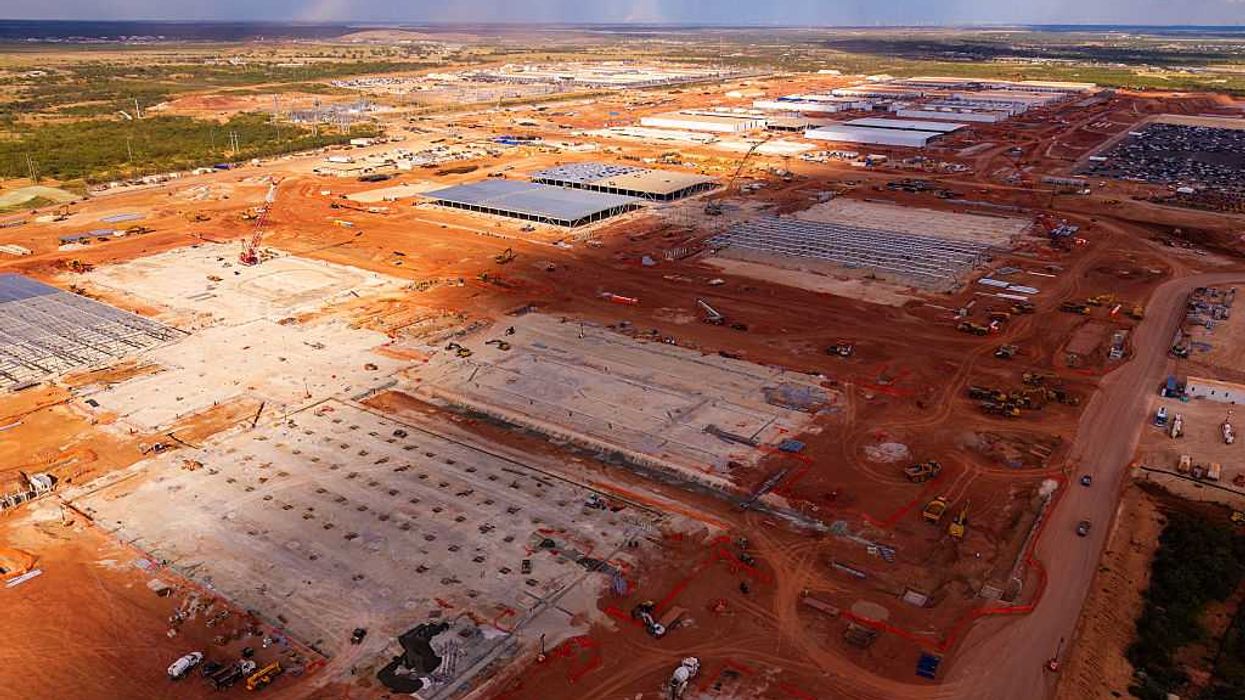 Kyle Grillot/Bloomberg via Getty Images
Kyle Grillot/Bloomberg via Getty Images
Republican leaders, meanwhile, worked to ban states from regulating AI at all. This summer they attempted to insert a sweeping prohibition into the budget reconciliation bill that would bar states from regulating data-center siting or AI content for 10 years. House Majority Leader Steve Scalise (R-La.) now seeks to attach the same language to the FY 2026 defense authorization act. President Trump backs the provision.
Instead of ceding the issue to the left, Republicans should correct course. They can channel AI toward focused, beneficial uses and away from a dystopian model that erodes civic life. Voters already want that shift. A new University of Maryland poll found residents believe — by a 2-1 margin — that AI will harm society more than it helps. More than 80% expressed deep concern about declining face-to-face interaction, the erosion of education and critical thinking, and job displacement fueled by AI.
Capital expenditures cannot sustain the current pace of expansion, and public patience with Big Tech’s demands is running out. The political party that recognizes these realities first will earn the credit. Right now, the party that once defended property rights, community values, and human-centered technology is getting lapped by the party that partnered with Big Tech oligarchs to censor Americans during COVID.
Republicans still have time to lead. But they won’t win a fight they refuse to join.
When the AI bubble bursts, guess who pays?

For months, Silicon Valley insisted the artificial-intelligence boom wasn’t another government-fueled bubble. Now the same companies are begging Washington for “help” while pretending it isn’t a bailout.
Any technology that truly meets consumer demand doesn’t need taxpayer favors to survive and thrive — least of all trillion-dollar corporations. Yet the entire AI buildout depends on subsidies, tax breaks, and cheap credit. The push to cover America’s landscape with power-hungry data centers has never been viable in a free market. And the industry knows it.
The AI bubble isn’t about innovation — it’s about insulation. The same elites who inflated the market with easy money are now preparing to dump the risk on taxpayers.
Last week, OpenAI chief financial officer Sarah Friar let the truth slip. In a CNBC interview, she admitted the company needs a “backstop” — a government-supported guarantee — to secure the massive loans propping up its data-center empire.
“We’re looking for an ecosystem of banks, private equity, maybe even governmental … the ways governments can come to bear,” Friar said. When asked whether that meant a federal subsidy, she added, “The guarantee that allows the financing to happen … that can drop the cost of financing, increase the loan-to-value … an equity portion for some federal backstop. Exactly, and I think we’re seeing that. I think the U.S. government in particular has been incredibly forward-leaning.”
Translation: OpenAI’s debt-to-revenue ratio looks like a Ponzi scheme, and the government is already “forward-leaning” in keeping it afloat. Oracle — one of OpenAI’s key partners — carries a debt-to-equity ratio of 453%. Both companies want to privatize profits and socialize losses.
After public backlash, Friar tried to walk it back, claiming “backstop” was the wrong word. Then on LinkedIn, she used different words to describe the same thing: “American strength in technology will come from building real industrial capacity, which requires the private sector and government playing their part.”
When government “plays its part,” taxpayers pay the bill. Yet no one remembers the federal government “doing its part” for Apple or Motorola when the smartphone revolution took off — because those products sold just fine without subsidies.
The denials keep coming
OpenAI CEO Sam Altman quickly followed with a 1,500-word denial: “We do not have or want government guarantees for OpenAI datacenters.” Then he conceded they’re seeking loan guarantees for infrastructure — just not for software.
That distinction exposes the scam. Software revolutions scale cheaply. Data-center revolutions depend on state-sponsored power, water, and land. If this industry were self-sustaining, Trump wouldn’t need to tout Stargate — his administration’s marquee AI-infrastructure initiative — as a national project. Federal involvement is baked in, from subsidized energy to public land giveaways.
Altman’s own words confirm it. In an October interview with podcaster Tyler Cowen, released a day before his denial, Altman said, “When something gets sufficiently huge … the federal government is kind of the insurer of last resort.” He wasn’t talking about nuclear policy — he meant the financial side.
The coming crash
Anyone paying attention can see the rot. Nvidia, OpenAI, Oracle, and Meta are all entangled in a debt-driven accounting loop that would make Enron blush. This speculative bubble is inflating not because AI is transforming productivity, but because Wall Street and Washington are colluding to prop up stock prices and GDP growth.
When the crash comes — and it will — Washington will step in, exactly as it did with the banks in 2008 and the automakers in 2009. The “insurer of last resort” is already on standby.
The smoking gun
A leaked 11-page letter from OpenAI to the White House makes the scheme explicit. In the October 27 document addressed to the Office of Science and Technology Policy, Christopher Lehane, OpenAI’s chief global affairs officer, urged the government to provide “grants, cost-sharing agreements, loans, or loan guarantees” to help build America’s AI industrial base — all “to compete with China.”
Altman can tweet denials all he wants — his own company’s correspondence tells a different story. The pitch mirrors China’s state-capitalist model, except Beijing at least owns its industrial output. In America’s version, taxpayers absorb the risk while private firms pocket the reward.
RELATED: Stop feeding Big Tech and start feeding Americans again
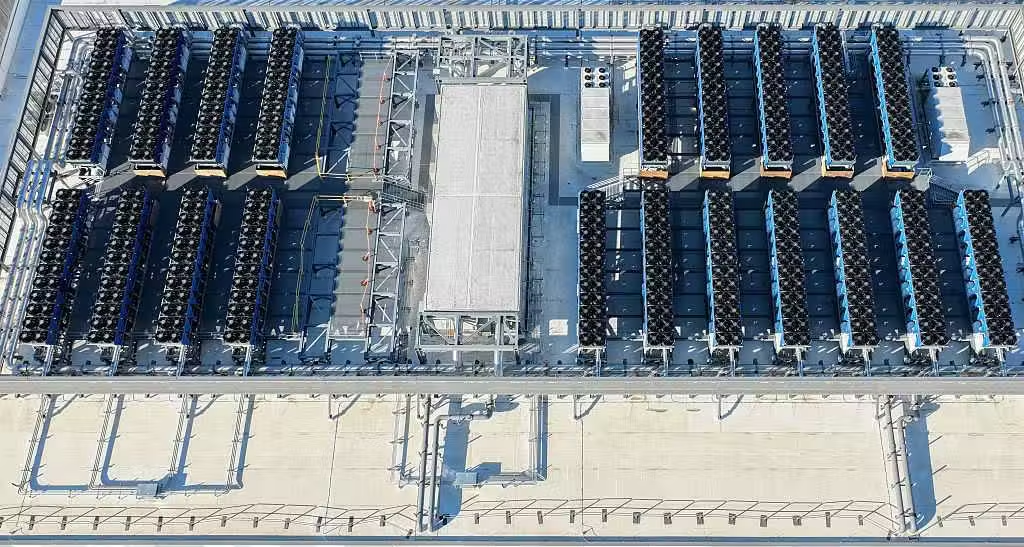 Credit: Photo by Mario Tama/Getty Images
Credit: Photo by Mario Tama/Getty Images
Meanwhile, the data-center race is driving up electricity and water costs nationwide. The United States is building roughly 10 times as many hyper-scale data centers as China — and footing the bill through inflated utility rates and public subsidies.
Privatized profits, socialized losses
When investor Brad Gerstner recently asked Altman how a company with $13 billion in revenue could possibly afford $1.4 trillion in commitments, Altman sneered, “Happy to find a buyer for your shares.” He can afford that arrogance because he knows who the buyer of last resort will be: the federal government.
The AI bubble isn’t about innovation — it’s about insulation. The same elites who inflated the market with easy money are now preparing to dump the risk on taxpayers.
And when the collapse comes, they’ll call it “national security.”
search
categories
Archives
navigation
Recent posts
- Gavin Newsom Laughs Off Potential Face-Off With Kamala In 2028: ‘That’s Fate’ If It Happens February 23, 2026
- Trump Says Netflix Should Fire ‘Racist, Trump Deranged’ Susan Rice February 23, 2026
- Americans Asked To ‘Shelter In Place’ As Cartel-Related Violence Spills Into Mexican Tourist Hubs February 23, 2026
- Chaos Erupts In Mexico After Cartel Boss ‘El Mencho’ Killed By Special Forces February 23, 2026
- First Snow Arrives With Blizzard Set To Drop Feet Of Snow On Northeast February 23, 2026
- Chronological Snobs and the Founding Fathers February 23, 2026
- Remembering Bill Mazeroski and Baseball’s Biggest Home Run February 23, 2026






